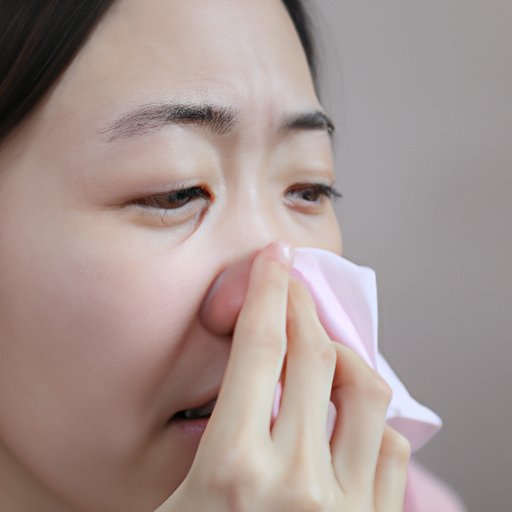
Introduction
Rhinitis is a common condition characterized by inflammation or irritation of the nasal passages. This condition can cause a variety of symptoms, including sneezing, congestion, and an itchy or runny nose. Understanding the symptoms of rhinitis is essential in identifying and managing this condition.
Everything You Need to Know About Rhinitis Symptoms: Causes, Treatment, and More
Rhinitis can be divided into three different types: allergic rhinitis, non-allergic rhinitis, and infectious rhinitis. Allergic rhinitis is caused by allergens, such as pollen, animal dander, or dust mites. Non-allergic rhinitis is caused by environmental factors, such as smoke or pollution, or genetics. Infectious rhinitis is caused by viruses or bacteria.
Common causes of rhinitis include environmental factors, genetics, and infections. Environmental factors that can cause rhinitis include pollution, the weather, and irritants such as cigarette smoke. Genetics may contribute to the development of the condition. Infectious rhinitis commonly occurs during seasonal cold and flu times.
There are several treatment options for rhinitis, including medication, alternative therapies, and lifestyle changes. For example, antihistamines and decongestants may be used to control symptoms. Alternative therapies include homeopathic remedies, acupuncture, and acupressure. Lifestyle changes such as avoiding triggers, getting enough sleep, and staying hydrated can also be helpful.
10 Common Signs and Symptoms of Rhinitis You Need to Know About
There are several common signs and symptoms of rhinitis that you should be aware of, such as:
- Sneezing
- Nasal congestion
- Runny nose
- Itchy nose, mouth, eyes, or throat
- Postnasal drip
- Fatigue
- Loss of smell or taste
- Headache
- Earache
- Coughing
If you’re experiencing these symptoms, over-the-counter medications such as antihistamines or nasal decongestants can be helpful in managing them. Additionally, home remedies such as saline sprays, nasal irrigation, and steam inhalation can also be beneficial.
Living with Rhinitis: How to Recognize and Manage Symptoms
Rhinitis can significantly impact daily life. For instance, it may impact the quality of sleep or interfere with work or school performance. If you’re having trouble managing the symptoms of rhinitis, it’s important to prioritize learning how to recognize and manage these symptoms.
Practical advice for managing symptoms of rhinitis includes:
- Using an air purifier
- Using a nasal saline spray or irrigation system
- Avoiding triggers such as smoke, dust, and strong odors
- Adjusting your diet to be more anti-inflammatory
- Reducing stress through meditation and mindfulness practices
Natural Remedies for Rhinitis Symptoms: What Really Works?
Natural remedies for rhinitis symptoms can be helpful in relieving symptoms. For instance, essential oils such as peppermint or eucalyptus can help to open up nasal passages, while honey or ginger tea can alleviate common cold symptoms. Although seemingly harmless, it’s important to be aware that some natural remedies for rhinitis may cause adverse reactions such as allergic reactions, gastrointestinal upset, or liver damage. It’s important to speak with your healthcare provider before starting a new natural remedy for rhinitis.
The Link Between Rhinitis Symptoms and Allergies: What You Need to Know
Allergies and rhinitis are closely linked. Allergic rhinitis is caused by an allergic response to an allergen, while non-allergic rhinitis is caused by other factors, such as smoke or pollution. Treatment for both types of rhinitis may include allergy tests and vaccinations to help manage symptoms.
If you’re experiencing both rhinitis and allergies, your healthcare provider may recommend allergy shots or other medications to manage symptoms. Additionally, avoiding triggers such as pollen, dust, or mold can help to alleviate symptoms of both conditions.
Conclusion
In conclusion, managing the symptoms of rhinitis requires an understanding of the different types and causes of the condition. Symptoms such as sneezing, congestion, and runny nose can be managed through medication, alternative therapies, and lifestyle changes. Identifying and managing the symptoms of rhinitis can greatly impact daily life and overall wellness. If you’re experiencing symptoms of rhinitis, speak with your healthcare provider to receive an accurate diagnosis and effective treatment plan.





